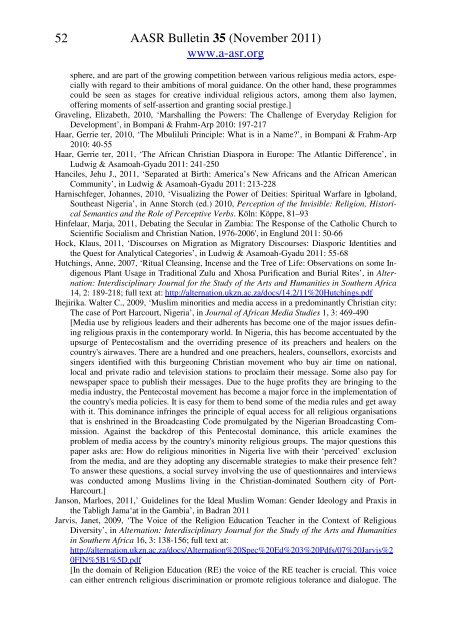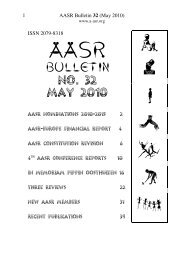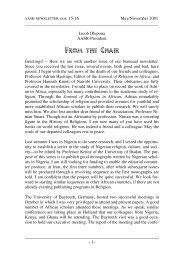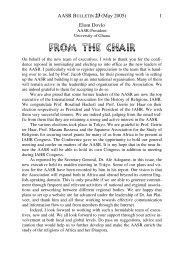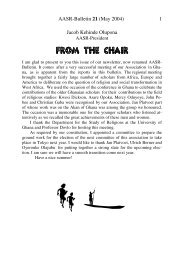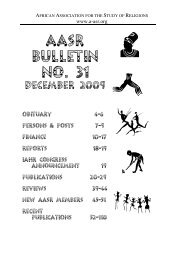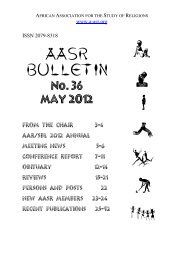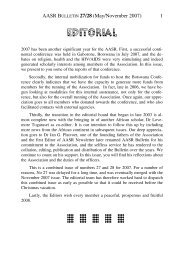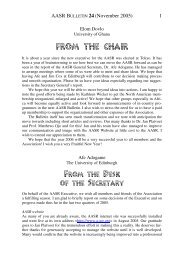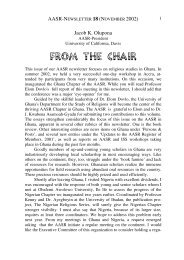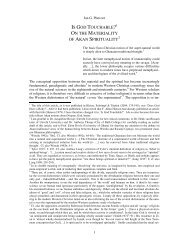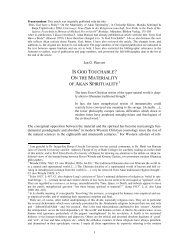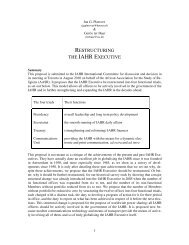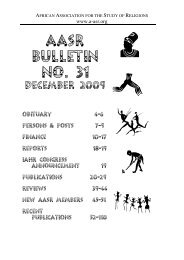AASR Bulletin 35 - The African Association for the Study of Religions
AASR Bulletin 35 - The African Association for the Study of Religions
AASR Bulletin 35 - The African Association for the Study of Religions
Create successful ePaper yourself
Turn your PDF publications into a flip-book with our unique Google optimized e-Paper software.
52<br />
<strong>AASR</strong> <strong>Bulletin</strong> <strong>35</strong> (November 2011)<br />
www.a-asr.org<br />
sphere, and are part <strong>of</strong> <strong>the</strong> growing competition between various religious media actors, especially<br />
with regard to <strong>the</strong>ir ambitions <strong>of</strong> moral guidance. On <strong>the</strong> o<strong>the</strong>r hand, <strong>the</strong>se programmes<br />
could be seen as stages <strong>for</strong> creative individual religious actors, among <strong>the</strong>m also laymen,<br />
<strong>of</strong>fering moments <strong>of</strong> self-assertion and granting social prestige.]<br />
Graveling, Elizabeth, 2010, ‘Marshalling <strong>the</strong> Powers: <strong>The</strong> Challenge <strong>of</strong> Everyday Religion <strong>for</strong><br />
Development’, in Bompani & Frahm-Arp 2010: 197-217<br />
Haar, Gerrie ter, 2010, ‘<strong>The</strong> Mbuliluli Principle: What is in a Name’, in Bompani & Frahm-Arp<br />
2010: 40-55<br />
Haar, Gerrie ter, 2011, ‘<strong>The</strong> <strong>African</strong> Christian Diaspora in Europe: <strong>The</strong> Atlantic Difference’, in<br />
Ludwig & Asamoah-Gyadu 2011: 241-250<br />
Hanciles, Jehu J., 2011, ‘Separated at Birth: America’s New <strong>African</strong>s and <strong>the</strong> <strong>African</strong> American<br />
Community’, in Ludwig & Asamoah-Gyadu 2011: 213-228<br />
Harnischfeger, Johannes, 2010, ‘Visualizing <strong>the</strong> Power <strong>of</strong> Deities: Spiritual Warfare in Igboland,<br />
Sou<strong>the</strong>ast Nigeria’, in Anne Storch (ed.) 2010, Perception <strong>of</strong> <strong>the</strong> Invisible: Religion, Historical<br />
Semantics and <strong>the</strong> Role <strong>of</strong> Perceptive Verbs. Köln: Köppe, 81–93<br />
Hinfelaar, Marja, 2011, Debating <strong>the</strong> Secular in Zambia: <strong>The</strong> Response <strong>of</strong> <strong>the</strong> Catholic Church to<br />
Scientific Socialism and Christian Nation, 1976-2006', in Englund 2011: 50-66<br />
Hock, Klaus, 2011, ‘Discourses on Migration as Migratory Discourses: Diasporic Identities and<br />
<strong>the</strong> Quest <strong>for</strong> Analytical Categories’, in Ludwig & Asamoah-Gyadu 2011: 55-68<br />
Hutchings, Anne, 2007, ‘Ritual Cleansing, Incense and <strong>the</strong> Tree <strong>of</strong> Life: Observations on some Indigenous<br />
Plant Usage in Traditional Zulu and Xhosa Purification and Burial Rites’, in Alternation:<br />
Interdisciplinary Journal <strong>for</strong> <strong>the</strong> <strong>Study</strong> <strong>of</strong> <strong>the</strong> Arts and Humanities in Sou<strong>the</strong>rn Africa<br />
14, 2: 189-218; full text at: http://alternation.ukzn.ac.za/docs/14.2/11%20Hutchings.pdf<br />
Ihejirika. Walter C., 2009, ‘Muslim minorities and media access in a predominantly Christian city:<br />
<strong>The</strong> case <strong>of</strong> Port Harcourt, Nigeria’, in Journal <strong>of</strong> <strong>African</strong> Media Studies 1, 3: 469-490<br />
[Media use by religious leaders and <strong>the</strong>ir adherents has become one <strong>of</strong> <strong>the</strong> major issues defining<br />
religious praxis in <strong>the</strong> contemporary world. In Nigeria, this has become accentuated by <strong>the</strong><br />
upsurge <strong>of</strong> Pentecostalism and <strong>the</strong> overriding presence <strong>of</strong> its preachers and healers on <strong>the</strong><br />
country's airwaves. <strong>The</strong>re are a hundred and one preachers, healers, counsellors, exorcists and<br />
singers identified with this burgeoning Christian movement who buy air time on national,<br />
local and private radio and television stations to proclaim <strong>the</strong>ir message. Some also pay <strong>for</strong><br />
newspaper space to publish <strong>the</strong>ir messages. Due to <strong>the</strong> huge pr<strong>of</strong>its <strong>the</strong>y are bringing to <strong>the</strong><br />
media industry, <strong>the</strong> Pentecostal movement has become a major <strong>for</strong>ce in <strong>the</strong> implementation <strong>of</strong><br />
<strong>the</strong> country's media policies. It is easy <strong>for</strong> <strong>the</strong>m to bend some <strong>of</strong> <strong>the</strong> media rules and get away<br />
with it. This dominance infringes <strong>the</strong> principle <strong>of</strong> equal access <strong>for</strong> all religious organisations<br />
that is enshrined in <strong>the</strong> Broadcasting Code promulgated by <strong>the</strong> Nigerian Broadcasting Commission.<br />
Against <strong>the</strong> backdrop <strong>of</strong> this Pentecostal dominance, this article examines <strong>the</strong><br />
problem <strong>of</strong> media access by <strong>the</strong> country's minority religious groups. <strong>The</strong> major questions this<br />
paper asks are: How do religious minorities in Nigeria live with <strong>the</strong>ir ‘perceived’ exclusion<br />
from <strong>the</strong> media, and are <strong>the</strong>y adopting any discernable strategies to make <strong>the</strong>ir presence felt<br />
To answer <strong>the</strong>se questions, a social survey involving <strong>the</strong> use <strong>of</strong> questionnaires and interviews<br />
was conducted among Muslims living in <strong>the</strong> Christian-dominated Sou<strong>the</strong>rn city <strong>of</strong> Port-<br />
Harcourt.]<br />
Janson, Marloes, 2011,’ Guidelines <strong>for</strong> <strong>the</strong> Ideal Muslim Woman: Gender Ideology and Praxis in<br />
<strong>the</strong> Tabligh Jama‘at in <strong>the</strong> Gambia’, in Badran 2011<br />
Jarvis, Janet, 2009, ‘<strong>The</strong> Voice <strong>of</strong> <strong>the</strong> Religion Education Teacher in <strong>the</strong> Context <strong>of</strong> Religious<br />
Diversity’, in Alternation: Interdisciplinary Journal <strong>for</strong> <strong>the</strong> <strong>Study</strong> <strong>of</strong> <strong>the</strong> Arts and Humanities<br />
in Sou<strong>the</strong>rn Africa 16, 3: 138-156; full text at:<br />
http://alternation.ukzn.ac.za/docs/Alternation%20Spec%20Ed%203%20Pdfs/07%20Jarvis%2<br />
0FIN%5B1%5D.pdf<br />
[In <strong>the</strong> domain <strong>of</strong> Religion Education (RE) <strong>the</strong> voice <strong>of</strong> <strong>the</strong> RE teacher is crucial. This voice<br />
can ei<strong>the</strong>r entrench religious discrimination or promote religious tolerance and dialogue. <strong>The</strong>


